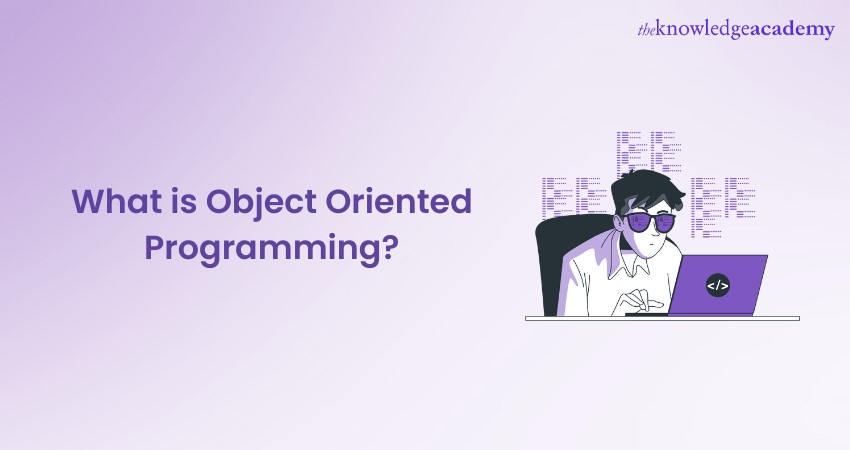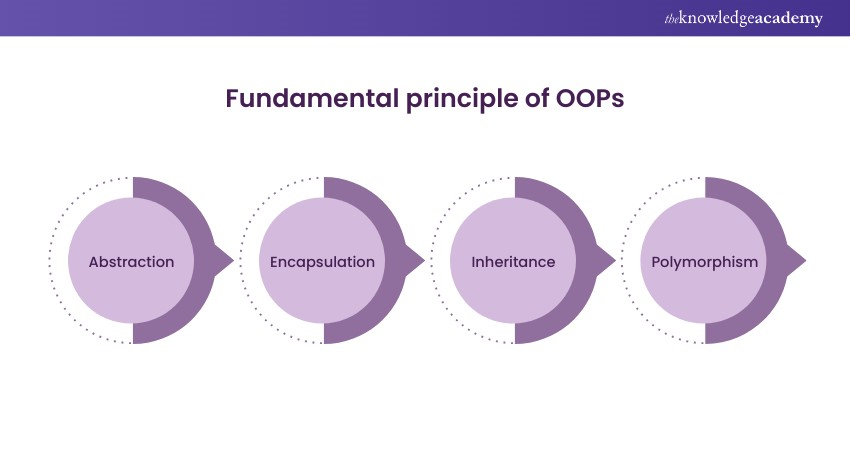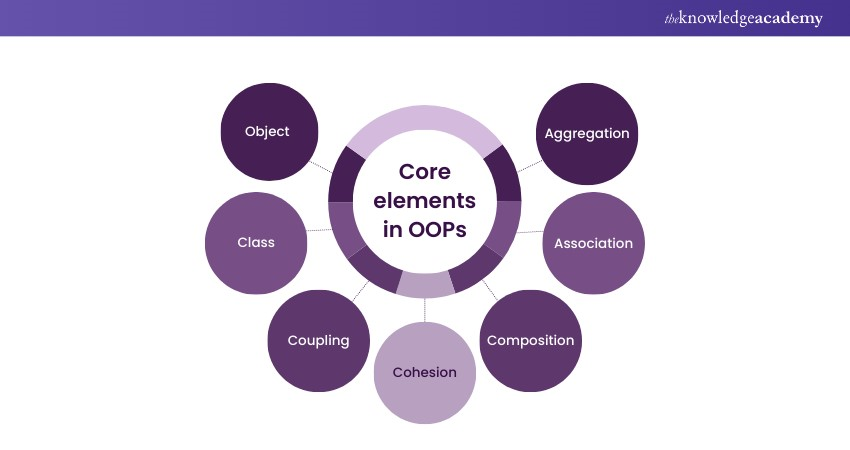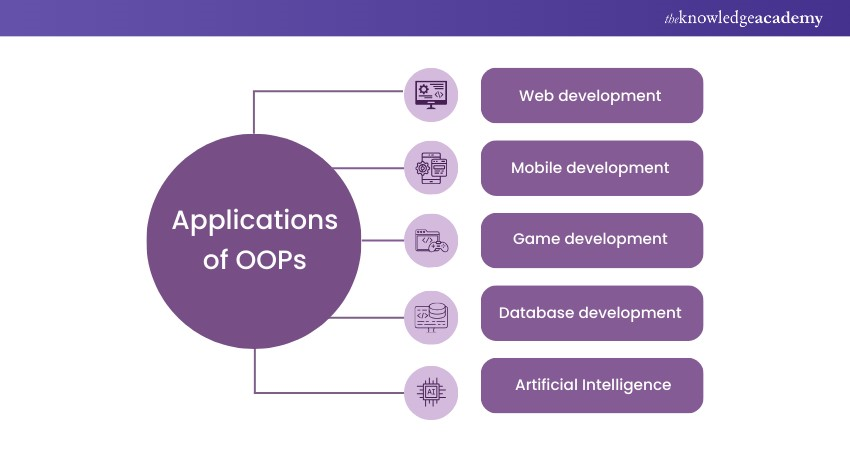We may not have the course you’re looking for. If you enquire or give us a call on + 1-866 272 8822 and speak to our training experts, we may still be able to help with your training requirements.
Training Outcomes Within Your Budget!
We ensure quality, budget-alignment, and timely delivery by our expert instructors.

Have you ever wondered What is Object Oriented Programming and why it is so popular and powerful in Software Engineering? Object Oriented Programming (OOPs) is a programming paradigm that organises data and behaviour into reusable units called Objects.
At the core of OOPs lies the concept that software systems can be represented as a group of interactable entities, each possessing distinct attributes and behaviours. In this blog, we will explore What is Object Oriented Programming, or OOPs for short, and how it can help you create and manage complex and dynamic software systems. We will also learn about OOPs fundamental principles and core elements, as well as its advantages and disadvantages.
Table of Contents
1) Understanding “What is Object Oriented Programming?”
2) Fundamental principles of Object Oriented Programming
3) Core elements of Object Oriented Programming
4) Advantages of OOPs
5) Disadvantages of OOPs
6) Applications of OOPs
7) Conclusion
Understanding “What is Object Oriented Programming?”
Object Oriented Programming is designing and writing software programs that focus on the Objects representing the concepts and entities in the problem domain. An Object is a self-contained unit that has a state and behaviour. The state of an Object is defined by its attributes, which are the variables that store the values of the Object’s properties. The actions of an Object are determined by its methods, serving as the functions that execute specific functionalities for the Object.
For example, consider a software system that manages a library. In this system, one of the Objects could be a book, which has attributes such as title, author, genre, and ISBN, and methods such as borrow, return, and reserve. Another Object could be a user, which has attributes such as name, email, and password, and methods such as login, logout, and search. These Objects can interact with each other through messages, which are the requests and responses that are exchanged between the Objects.

Fundamental principles of Object Oriented Programming (OOPs)
OOPs is based on four fundamental principles; abstraction, encapsulation, inheritance, and polymorphism. These principles help to achieve the goals of OOPs, such as modularity, maintainability, and reusability. Here’s a detailed list:

Abstraction
Abstraction in Object Oriented Programming involves concealing unnecessary details of an Object, exposing only essential features. It reduces the cognitive load for programmers and users, allowing focus on relevant aspects. For instance, a book Object abstracts storage and printing details, providing only pertinent information like title, author, genre, ISBN, and relevant operations like borrow, return, and reserve.
Encapsulation
Encapsulation bundles an Object's data and behaviour, hiding internal implementations. It safeguards the Object's state integrity and enforces access rules. A book Object, for instance, encapsulates attributes such as title and methods like borrowing, and shielding implementation details. Access modifiers differentiate which attributes and methods are accessible by other Objects versus restricted to the book Object itself.
Inheritance
Inheritance involves creating new classes, inheriting attributes and methods from existing ones, and preventing code duplication. A book Object can be a subclass of a more general item Object, inheriting common attributes like ID and name while introducing its specifics like title and author. It can also be a superclass for subclasses like fiction books, inheriting and extending attributes.
Polymorphism
Polymorphism allows Objects to exhibit different forms and behaviours based on context or type. A book Object, being polymorphic, may respond differently to the same message based on its type (fiction, non-fiction, etc.) or state (available, borrowed, reserved). Additionally, it can implement a generic interface, like 'item,' defining common attributes and methods for all library items.
Core elements in Object Oriented Programming (OOPs)
Object Oriented Programming is based on some core elements that define the structure and behaviour of the Objects and the relationships between them. These elements are Object, class, coupling, cohesion, composition, association, and aggregation. Take a look at the comprehensive list below:

Object
An Object is a self-contained unit with a state and behaviour. It's an instance of a class, a blueprint defining the Object's attributes and methods. For example, a book Object may have attributes like title, author, and methods like borrow and return.
Class
A class is defined as a blueprint that defines the attributes and methods of a type of Object. It includes constructors to create and initialise instances. In the context of a library system, a book class might define attributes such as title and author, along with methods like borrow and return.
Coupling
Coupling measures the interdependence between classes or Objects. Tight coupling implies high dependency, while loose coupling suggests independence. A library system with loose coupling between the book and user classes ensures flexibility.
Cohesion
Cohesion measures the relatedness and consistency within a class or Object. High cohesion implies attributes and methods are closely related, contributing to better understanding and maintainability. In a book class, attributes like titles and methods like borrowing exhibit high cohesion.
Composition
The composition represents a whole-part or part-of relationship. A book Object could comprise page Objects, indicating a strong ownership and dependency relationship. The book controls the lifetime and behaviour of its pages.
Association
Association signifies a connection or link between classes or Objects. A book Object might be associated with a user Object in a library system. This implies a weak and optional connection, where both entities can exist independently.
Aggregation
Aggregation is a special association implying a whole-part relationship with weak and shared ownership. For instance, a library Object might have an aggregation relationship with book Objects. The library doesn't control the book's lifetime; books can exist independently.
Enhance your coding skills and unleash the potential of web development with our Ruby Programming Course. Join today!
Advantages of OOPs
Object Oriented Programming has advantages over other programming paradigms, such as Procedural and Functional programming. Some of the advantages of OOPs are:
a) OOPs makes software development more modular, maintainable, and reusable by organising data and behaviour into reusable units called Objects and by applying some fundamental principles and core elements.
b) OOPs makes software development more intuitive and natural by modelling software systems as a collection of interactable entities with specific attributes and behaviours and reflecting the concepts and entities in the problem domain.
c) OOPs makes software development more flexible and adaptable by creating higher-level concepts and categories that can be reused and extended and by enabling the same message to be interpreted and executed differently by different Objects.
d) OOPs makes software development more robust and reliable by protecting the integrity and consistency of the Object’s state and by enforcing the access and modification rules of the Object’s attributes and methods.
Disadvantages of OOPs
Object Oriented Programming also has disadvantages and limitations that must be considered and addressed. Some of the disadvantages of OOPs are:
a) OOPs can increase the complexity and overhead of software development by introducing more layers of abstraction and encapsulation and requiring more design and planning decisions.
b) OOPs can reduce the performance and efficiency of software systems by consuming more memory and processing resources and by adding more indirection and overhead to the execution of the messages and methods.
c) OOPs can introduce some challenges and difficulties in software testing and debugging by hiding the internal implementation and state of the Objects and making the Objects' behaviour more dynamic and unpredictable.
d) OOPs can create problems and conflicts in software integration and interoperability by imposing some constraints and assumptions on the structure and behaviour of the Objects and by requiring some compatibility and standardisation between the different classes and Objects.
Transform data with R expertise. Join our R Programming Course to elevate your analytical skills and career potential.
Applications of OOPs
Object Oriented Programming is widely used and applied in various domains and fields of software development, such as web development, mobile development, game development, database development, and artificial intelligence. Some of the applications of OOPs are:

Web development: OOPs is used to create dynamic and interactive web applications that use Objects, such as HTML, CSS, JavaScript, PHP, Ruby, and Python, to represent and manipulate the data and the user interface of the web pages.
a) Mobile development: OOPs is used to create native and cross-platform mobile applications that use Objects to represent and control the data and the user interface of mobile devices, such as Java, Kotlin, Swift, Objective-C, and Flutter.
b) Game development: OOPs is used to create immersive and realistic game applications that use Objects to model and simulate the characters, scenes, and physics of the game world, such as C++, C#, Unity, Unreal Engine, and Godot.
c) Database development: OOPs is used to create and manage relational and non-relational database systems that use Objects, such as SQL, MongoDB, and Firebase, to store and query the data and the metadata of the database.
d) Artificial Intelligence: OOPs is used to create and implement intelligent and learning systems that use Objects, such as Python, TensorFlow, PyTorch, and Keras, to represent and manipulate the data and the logic of the system.
Unlock the power of OOPs languages with our comprehensive Object-Oriented Programming (OOPs) Course. Sign up now!
Conclusion
Understanding What is Object Oriented Programming provides a foundational insight into the design and development of robust, flexible, and scalable software systems. OOPs makes software more modular, maintainable, and reusable by applying principles and elements such as abstraction, encapsulation, inheritance, and polymorphism. OOPs has pros and cons, such as increased complexity and slower performance. Object Oriented Programming stands as a prevalent programming paradigm, offering support for numerous languages like Java, C++, Python, and Ruby.
Advance your coding skills today with our diverse range of Programming Training. Join today!
Frequently Asked Questions

OOPs is a programming paradigm that organises code into Objects, each encapsulating data and behaviour. It promotes modularity and reusability by structuring software around real-world entities.

OOPs enhances code flexibility, scalability, and maintainability. It simplifies complex systems, fosters code organisation, and supports collaborative development, making it crucial for building robust and efficient software.

OOPs principles include encapsulation, inheritance, and polymorphism. Encapsulation protects data integrity, inheritance facilitates code reuse, and polymorphism allows Objects to take multiple forms, fostering code flexibility and extensibility.

The Knowledge Academy takes global learning to new heights, offering over 30,000 online courses across 490+ locations in 220 countries. This expansive reach ensures accessibility and convenience for learners worldwide.
Alongside our diverse Online Course Catalogue, encompassing 17 major categories, we go the extra mile by providing a plethora of free educational Online Resources like News updates, blogs, videos, webinars, and interview questions. Tailoring learning experiences further, professionals can maximise value with customisable Course Bundles of TKA.
The Knowledge Academy’s Knowledge Pass, a prepaid voucher, adds another layer of flexibility, allowing course bookings over a 12-month period. Join us on a journey where education knows no bounds.

The Knowledge Academy offers various Object Oriented Programming (OOPs) Course, including Python Course, PHP Course, Swift Training etc. These courses cater to different skill levels, providing comprehensive insights into Introduction to OOPs.
Our Programming & Devops blogs covers a range of topics related to Object Oriented Programming (OOPs), offering valuable resources, best practices, and industry insights. Whether you are a beginner or looking to advance your Project Management skills, The Knowledge Academy's diverse courses and informative blogs have you covered.

The Knowledge Academy’s FlexiPass is a pre-paid training voucher that is built specifically for clients and their dynamic needs. It provides access to a wide range of courses, at a pre-determined price, with robust safety measures. FlexiPass gives clients the added benefit of upskilling on a budget that best fits them.
Upcoming Programming & DevOps Resources Batches & Dates
Date
 Object Oriented Programming (OOPs) Course
Object Oriented Programming (OOPs) Course
Fri 10th Jan 2025
Fri 14th Feb 2025
Fri 11th Apr 2025
Fri 13th Jun 2025
Fri 8th Aug 2025
Fri 26th Sep 2025
Fri 21st Nov 2025







 Top Rated Course
Top Rated Course


 If you wish to make any changes to your course, please
If you wish to make any changes to your course, please


